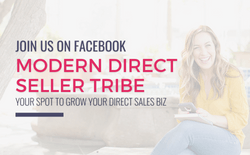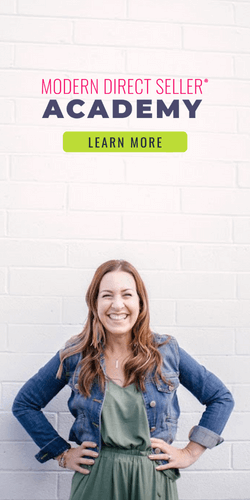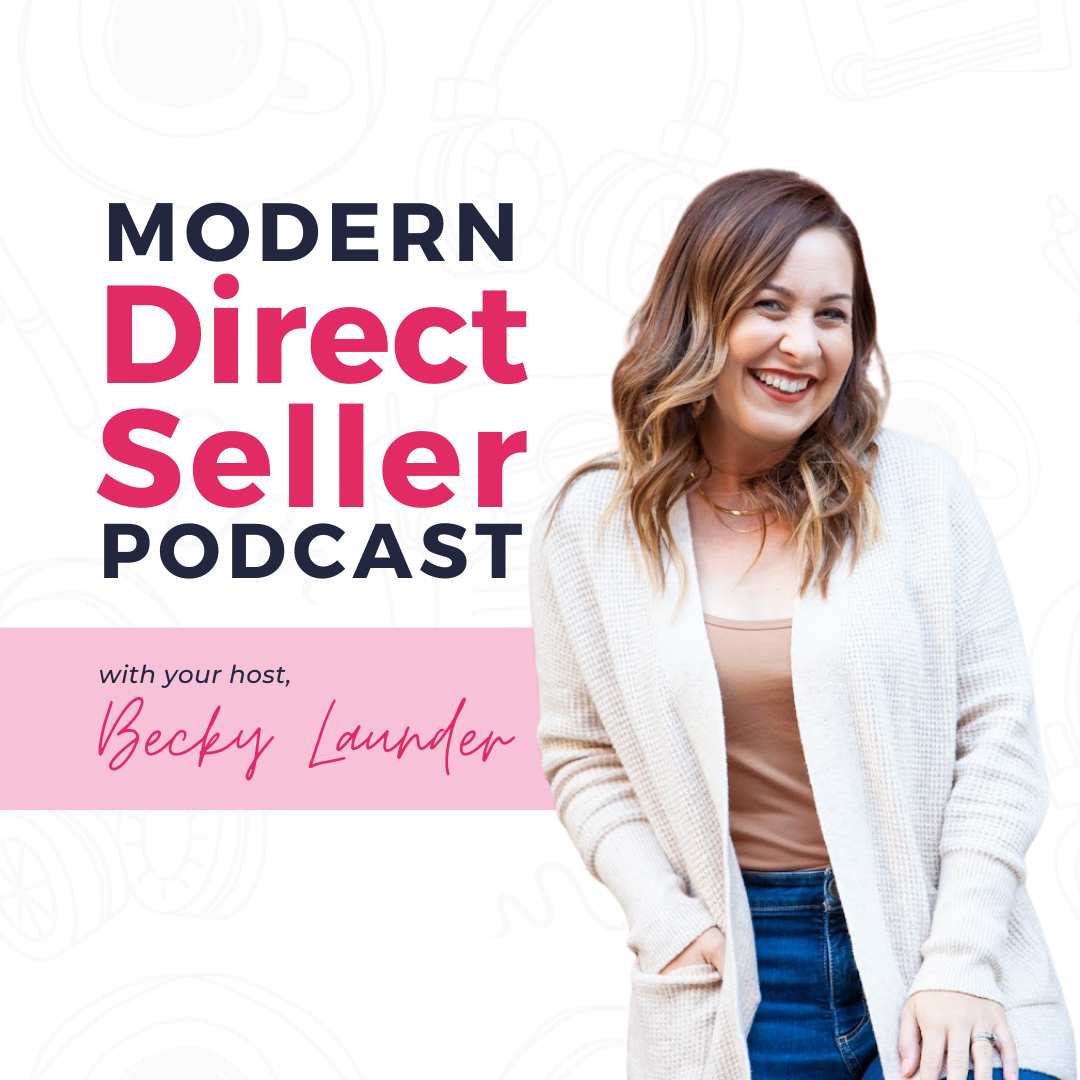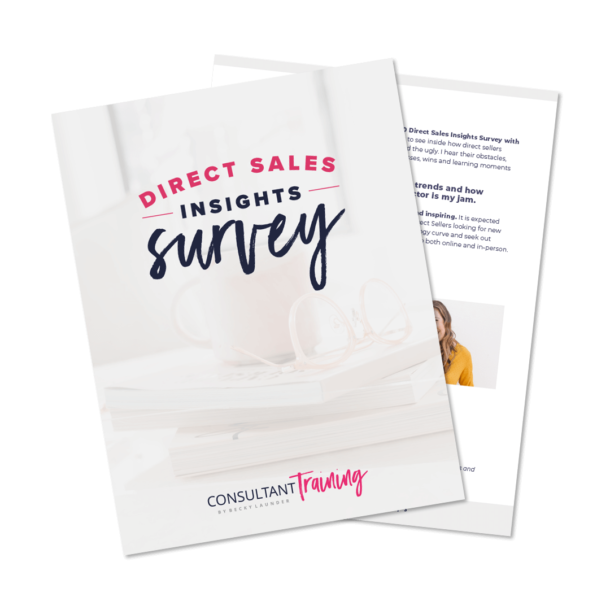On today’s episode of the Modern Direct Seller Podcast, we’re joined by Jill Strahan, founder and CEO of Tastefully Simple! Since its beginning in 1995, her company has grown to $143 million in sales, and she’s here to share her most impactful lessons from business and life with us. Listen in as she talks about what brought her to where she is today, what she thinks makes a direct seller effective, and the trends she sees impacting in the industry—as well as her tips for reframing your mindset to see even more success!
Learn more about Jill and her journey at TastefullySimple.com, or connect with her on her website!
Time based notes:
- 1:24 Jill Strahan introduction
- 7:33 Bringing a team to Tastefully Simple
- 9:52 Facing challenges at Tastefully Simple
- 20:49 What makes a successful direct seller
- 23:21 Getting the most from direct selling
- 25:38 Continuing trends in direct sales
Reframe Your Thoughts and Actions for Success with Jill Strahan
On this week’s episode of the Modern Direct Seller Podcast, we were joined by Jill Strahan, founder and CEO of Tastefully Simple. She shared her most impactful lessons from business and life, including what brought her to where she is today, what she thinks makes a direct seller effective, and the trends she sees impacting in the industry—as well as her tips for reframing your mindset to see even more success!
Jill, for those who don’t know you, tell us a little bit about your background and how you became the CEO and founder of Tastefully Simple. I know there’s a good story in there.
There’s a good story—and a long story, of course, like any of us. We won’t start back at my birth. But, I am actually a dairy farmer’s daughter. The idea for Tastefully Simple came after college, and after I had my gift basket business. I started that business in Alexandria, Minnesota, not far from where I was born and raised as a dairy farmer’s daughter. And, I would put these gift baskets together, some with bath items, some with other fun themes, but the one that was the most popular was Tummy Tickler. And, the Tummy Tickler had a lot of open-and-enjoy items, but sometimes I would put in things for easy-to-prepare foods. “Just add water to the soup. Just add beer to the bread.”
After that, I found a little crafters tour in Outstate Minnesota, where artisans would go to different homes and sell and show their wares, and I asked if I could sell the products that were in my baskets, even though I didn’t make those products myself, because I thought they would have value. And I asked, “Can shoppers taste the products?” The organizer said, “That would be great.” So, that first weekend in November, I took a couple hundred dollars of basket orders and sold a couple thousand dollars in food. And, that happened two years in a row. So, that was the beginning and end of my market research. I thought, “If this sells in Outstate Minnesota, these products would sell anywhere.” But, I didn’t have the concept for doing it through direct sales until a couple of years later.
So, I worked on the business plan for about 3 or 4 months, and launched and had my first party on June 15, 1995. And, I started out, truly, on a dream and a shoestring. Twelve-hundred-square-foot shed. No running water. And, I packed orders on a pool table. I was the only employee. I was the only one out selling in the beginning. I would work at my headquarters by day, and do tasting parties at night, and you know what? The lesson I learned in all of that was: It’s the start that stops us. And, I share that a lot. Start where you are, and have a willingness to learn, and reserve the right to get smarter, and learn as you go.
I love that you were actually out there doing the parties. So, when those early days were happening, packing orders on a pool table, you were the one person in the company that was out there selling. And, you did that for a little while, before you even brought in other people to start selling as well, right?
I didn’t do it for very long, because I had someone almost at every single party saying they were interested in joining me. And literally, I would say to them, “As you can clearly see, I have no idea what I’m doing.” And, they would smile and nod; you could see that. But, I said, “Here’s the deal: I believe in this concept. It’s for busy people. And, I believe people are going to get busier, not less busy.” That was 27 years ago, and it was true. So, I’d say, “If you’re interested in coming along with me and figuring it out together, come along with me and we’ll figure it out together.”
And, I still tell that to our consultants, because what stops us is that we think we have to know everything. And, we don’t. We just have to acknowledge that and step into it.
One of our Tastefully Simple principles is “be real.” I called it “the Law of Realness” 20 or 25 years ago, when I created the principles, but it’s about being real and telling people the truth, because, as we know today, that’s a big deal. People want to that authenticity. They want to work with people who are genuine. And, that was the premise on which the whole company was built.
I think that really speaks to building that trust factor, too. No matter if you’ve just gotten started in your business, or you’ve been doing this for a while, you need to show the human side of you, and know that you’re going to make mistakes, and know that things aren’t always going to go according to plan. You need to own it, because people appreciate that, and they can relate to that. The more you can be real and share that side of your story—even when you’re out there doing a virtual party, doing an in-home party, doing a tasting—the more people will be drawn to you. So, I love that you were doing that from Day One.
Let’s fast-forward a little bit. The last couple of years have been a wild ride, to say the least. We’ve had ups; we’ve had downs. We’ve seen a lot of people join direct sales; we’ve seen a lot of people step away from direct sales. We’ve seen businesses boom. And, I’m sure with the longevity of Tastefully Simple, you’ve seen these cycles happen. So, share with us some of the challenges that you’ve faced along the way, and really how you’ve overcome them.
Well, there’s a lot to unpack there. It has been a wild ride for us. In the beginning of the business, it was crazy, because I didn’t know what I was doing. It was only that I had a willingness to learn. So, in the first five years, we did $11 million in sales. And, the next year was $34 million. And, the next year was $78 million. And, the next year, it was $113 million. And, eventually, our peak was $143 million. And then, part of the wild ride: Eleven years of declining sales. Every single year, declining sales. No profit. Losing money. The team, not taking any raises. And of course, a lot of layoffs, too. Which, you know, there’s a lesson there: I’m so incredibly grateful to people who stayed by us during tough times. That’s a big blessing. The people who rally around you and trust you in difficult times help you build a stronger core.
So, we finally had profit again in 2019, and we started rebuilding our core when I stepped in and was leading the company again. I’d always been very involved, but I was not leading the day-to-day as much or having the team directly report to me. So, I stepped back into that, and then COVID hit.
Luckily, Tastefully Simple was a business that saw success after COVID, because people were eating at home. They needed to figure out what they were going give their family for dinner, and some of that was a boon for us, but only because we had worked really hard to rebuild the core of the business before the pandemic hit. At the same time, we had 3,000 consultants join in one month, we had an amazing Business Blast-Off kit, we had new Party Food kits… And so, the timing happened right for us.
But, the other thing I did—and my lesson learned there—was putting things in context when we hit obstacles. Here’s a couple of questions I ask myself. The first one is: “What’s the worst thing that’s going to happen? We’re going to die?” Because, I lost my older brother when I was 26 years old. It rocked my world. But, I learned so much from that experience, and I became a different person because of it, in that I really use that as my litmus test for intimidating experiences. What’s the worst thing that’s going to happen if you just try? You’re not going to die. And, I call it my “mortality threshold.” We’re all mortal. None of us are going to get out of this alive. So, why not just try?
It definitely shifted my thinking, Number One. And, Number Two, I use what I call the “deathbed test” in my decisions. For example, during COVID, I was encouraged to shut our doors. My turnaround expert didn’t come right out and say that, but that’s definitely what was being implied. And, I ended up putting my own money into the business to keep the doors open, but that was a big decision. And so, I used the deathbed test, and I thought, “Jill, imagine that you’re on your deathbed”—like my brother was. I want to have as few regrets in life as I possibly can. So, I used the deathbed test and asked, “Will I be on my deathbed and think, ‘Jill, if only you had waited a little longer and tried and invested some money’?” Or, will I think, “Oh, my gosh, you are such a moron. Why did you do that?” And, it’s true in any big decision in life to be able to say, “Will I regret it if I was on my deathbed?”
I pressure-test my thinking by asking those two questions of myself.
I love that. And, I think that those just really speak to how quickly we sometimes give up on things, too. I think about a direct seller that might be listening right now, and so often, people say, “I just don’t know if I’m cut out for this,” or “I just don’t know if this is for me,” or “I don’t know. I’m trying all the things, and I’m still not getting where I want to be.” And, maybe I’m an eternal optimist over here, but I’m always like, “Your next ‘yes’ is right around the corner.” The next party, the next teammate that joins, the next big thing for you is coming.
But, it’s so easy to want to throw in the towel when things get tough, and not keep going when you’re feeling deflated. So, I appreciate your transparency in sharing your thought process and what it’s like, because I think so often, we don’t hear that side of the story on the corporate side, or some of these big decisions that are being considered.
Oh, absolutely. And It is so true that we need to replace that thinking. I also lost my youngest brother the third year after I started Tastefully Simple, and then, eight months later, my husband died. And, I had my 5-year-old son. So, there’s absolutely this fear that sets in, and we think we’re driven by the fear. But actually, we’re driven by what we’re thinking about. Sometimes we have to listen to those thoughts, the good and the bad. But sometimes it’s just doubt, and it’s time to move on.
And being able to reframe those thoughts to keep moving ourselves forward is probably the biggest skill you could add to your toolkit in life. I love that.
So, let’s talk about successful direct sellers next. Because, you’ve been in this industry. You’ve seen people thrive, and you’ve seen life-changing events happen to their families because of Tastefully Simple, and on the flip side, you’ve seen other people that have walked away—and that’s okay, too. So, what would you say are those common attributes, or that theme, that you see among top performers and the most successful direct sellers out there?
That’s a great question. I’ll give you two.
The first one is, absolutely, a willingness to learn. And actually, I’m going to pull this up as a bigger umbrella. It’s about humility. Because I boiled the Law of Realness at Tastefully Simple down to seven words. It’s about—well, being abundant is about—”fostering peace of mind through win-win attitudes.” But, “being real is building trust through humbleness.” We have to be humble enough to say, “I don’t know it all.” And by gosh, I hope everybody has that mentality, no matter how long you’ve been in direct sales, because the people that continue to thrive are those that are willing to learn and change.
The second thing is part of humility, and that’s saying, “I don’t believe in failure.” Many, many, many years ago, I read somewhere, “We reserve the right to get smarter.” That adage takes away the idea that we do things wrong or that we fail. Instead we’re saying, “There’s a reason that we’re going to be better because of whatever happened.” There’s a humility in saying, “I didn’t fail. It’s just, I reserve the right to get smarter.”
I love that it’s reframing it. Not, “I am a failure,” but “I am willing to get smarter.” So, there it goes again with those thoughts that you’re putting into your head, and how those play out in your emotions and your actions. That just took it full-circle.
So, if you’re in direct sales, and you really are, wanting to get smarter, and you’re wanting to learn, and you’re willing to fail, how do you feel like people can get the most from the opportunity? Because, it’s really unique compared to other businesses out there, and we want sellers to take advantage of that.
This is going to be trite, but I’m going to say it anyway: I just believe that the most successful people, the ones seizing the opportunity, goes back to the core of being madly in love of whatever it is you’re selling.
In the beginning, I remember sitting in the shed when somebody with Longaberger Baskets called me and asked, “How does your compensation plan compare to Longaberger Baskets?” I said, “That’s a very good question. May I get back to you?” So, I thought about it overnight, and I called this individual back, and I said, “You know, I debated about comparing our comp plan to Longaberger’s, and what it boils down to is, they’re all so similar.” I mean, they’re all quite similar. There are so many nuances of compensation plans. So, I said, “Are you selling what you love?”
I think the opportunity is just being passionate. And, that’s what’s interesting about direct sales, is you’re selling a product that you love and you’re passionate about. That’s Number One. The second thing I heard from Earl Nightingale—which is showing my age. But, he once said at a rally, “Assume that everyone is on a giant conspiracy to help you.” And, that relates back to taking advantage of the opportunities that you see. Because again, it replants that seed that it’s the start that stops us.
Well, and that can really give you the confidence to make those asks, because I think that that’s such a big piece of what we do in direct sales, and also where a lot of people get hung up. Like, “I don’t want to ask that person for the party. I don’t want to ask for a sale. What if they think that I’m bugging them?” But, when you reframe it, it’s a lot easier to say, “Hey, they’re here to help me, right?” It’s totally about the mindset. I love it.
Okay, so the industry as a whole continues to evolve. We’ve seen dramatic changes over the last few years, and we’ve pivoted and pivoted again. So, if we’re looking into this next year, what do you see as rising trends in direct sales? What do you think might be changing, or looking a little different than it has in the past?
I don’t know if it’s different. I think it’s just still continuing. The biggest shift has been around technology and all the distractions that brings. We need to think about how to leverage it, but also how not be so distracted by it; we need to find the balance. For example, we’ve seen challenges with Facebook from a party perspective. With the algorithms and everything else, it’s been a big challenge this year more than any other. But, I think there’s so much opportunity in Zoom, especially when it comes to leveraging it for parties, and for people who don’t want to clean their houses and host a bunch of people. So, I think there’s going to be a continuing trend of, “How are we balancing technology with personal interaction, and yet still keeping it as simple as possible?”
The second thing for us, personally, is the economy and the recession on top of everything else. How do we leverage that? I’m saying to our people, “Okay, yeah, people maybe have less money.” But, back when Cheryl Lightle was my mentor, something she told me about starting Tastefully Simple was, “Go least to most.” And, what that meant was, if you give really a lot of incentives, or you give a lot to your team, or you give a lot to your clients, and then you have to go back down again and lose some of that, it’s a takeaway. Instead, always start low, and then you can add more, because if you have to take something away, it’s going to erode trust.
With Tastefully Simple, the shift and the addition has been helping clients understand how to use our products in a way that serves them, especially now that people aren’t going to be spending money in restaurants as much, because it’s just too expensive. So, we’ve had to look at leveraging that.
I like that. Just meeting people where they’re at. And, I think that also speaks to opportunity. You know, I think this next year… I’m going to say it. I’m going to put out there. I feel like we’re going to be adding more people to our teams this next year, as people are looking for an extra income stream. And, that comes with economy. And, even if it is just that personal discount that they’re using on their own purchases, it adds up, and I think people are going to be paying a lot more attention to that than maybe they have over the last couple of years.
That’s a very good point.
Always a silver lining.
Become a corporate client: ModernDirectSeller.com/Corporate.
Take Action: What steps can you take to improve your business mindset?








0 Comments